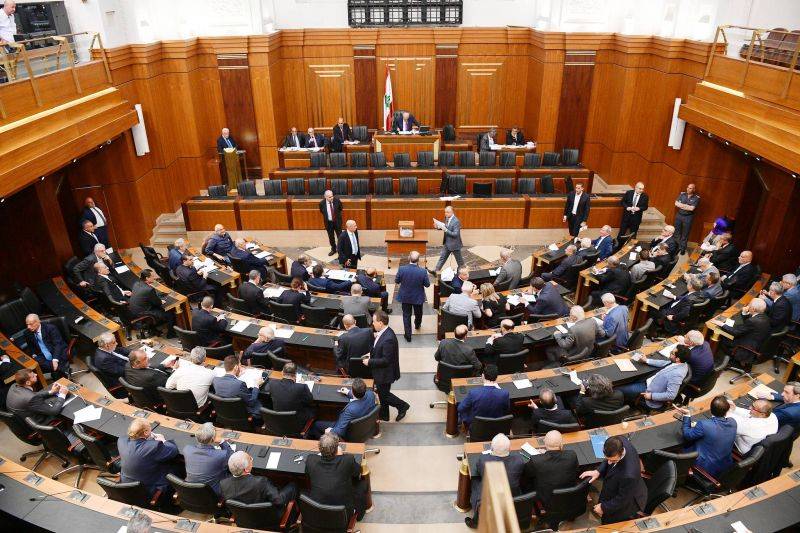
Parliament meets in June for its internal elections. (Courtesy of Parliament Flickr account)
“You will come back, won’t you?” It’s April 2014. The MPs for the Free Patriotic Movement and their Hezbollah allies left the session held to elect the president, after the first round.
Parliament Speaker Nabih Berri encouraged them to return, but they boycotted all sessions, until October 2016, preventing the well-known two-thirds quorum (86 MPs of the 128) from being met.
Thus, they succeeded in blocking the presidential election until the election of their candidate, Michel Aoun, became certain.
Six years later, a few weeks before Sept. 1, the date when the election of Aoun’s successor is due to begin, there is a question on everyone’s lips: will the parties hostile to the government in place give Hezbollah a taste of its own medicine, by taking the quorum hostage with the aim of having a president who meets their criteria elected?
While this political weapon is undoubtedly effective — which allows one third of the MPs (43 of 128) to block the presidential election — it remains controversial, to say the least, and puts the opposition MPs in the face of a major dilemma.
If the traditional parties of the opposition (the Lebanese Forces, the Progressive Socialist Party, the protest movement, the Kataeb and some independents) reach an agreement, they will certainly be able to prevent the election of a pro-Hezbollah candidate, such as Marada leader Sleiman Frangieh who is a serious presidential candidate.
Yet, by doing so, they will be taking part in the obstruction of a key constitutional election in Lebanese politics, while they do not miss any opportunity to denounce the blocking and sabotage tactics used by the opposing camp.
“Constitutional creativity”
When asked about the possibility of resorting to a blockage to prevent a March 8 candidate from being elected, the Lebanese Forces, which has a large bloc of 19 MPs, dodged the question.
“It is still too early to talk about it,” said Charles Jabbour, the spokesman for the LF.
“But last month, we rallied 60 MPs behind the candidacy of Ghassan Skaff for the post of deputy speaker of Parliament. With a little more effort, five more MPs will rally behind a reformist candidate (65 votes are enough for him to be elected president in the second round). In this case, it will be Hezbollah’s camp that will seek to obstruct,” Jabbour added.
For their part, the protest movement’s MPs (13) have not yet expressed a clear position. According to information obtained by L’Orient-Le Jour, they will meet in the coming days to discuss the upcoming election.
Zgharta MP Michel Mouawad, member of the Renewal bloc (four MPs), is more specific. “We must not repeat the mistakes done in recent months. To do this, we must unite the opposition around a candidate who carries its project, and use all means to get him elected,” said Mouawad.
He added, “Obstruction is far from being our preferred option. But it is a legitimate last resort in the face of the election of a president who will prolong Lebanon’s descent into hell for another six years.”
Since May’s parliamentary elections, Mouawad, who is himself seen as a presidential candidate, has played the role of mediator between the traditional opposition parties and the elected representatives of the protest movement.
The Kataeb (four MPs) also seem determined to prevent the Hezbollah camp from electing its candidate. “We believe that all constitutional options are worth considering to elect a transparent president, capable of restoring confidence and presiding over a real dialogue to rethink the national and social pact,” Kataeb Vice President Salim Sayegh told L’Orient-Le Jour.
For him, it is essential, by all means, to prevent the accession of a pro-Hezbollah candidate to Baabda, even if it would require “constitutional creativity.”
What quorum?
However, blocking the election of the president by a third of the MPs is not necessarily constitutional.
According to former MP and constitutional expert Salah Honein, “Constitution Article 34 states that a quorum of an absolute majority is required to hold a parliamentary session, namely 65 MPs. If the election of a president requires a different quorum, the Constitution would have made that clear,” he said.
“While Article 49 specifies that a two-thirds majority of the MPs is required to elect the president in the first round, one must distinguish between a majority [of the votes] to elect a president and a quorum [to hold the session],” Honein said.
“The Constitution encourages a broad agreement around a [presidential candidate], which is why a two-thirds majority of MPs is required in the first round. But the article does not require a consensus at the expense of democracy and certainly does not allow a small group of MPs to block the election,” he said.
However, in the past 50 years, only Sleiman Frangieh’s election in 1970 gave the impression of being the result of a real democratic competition, as he won by only one vote over his competitor Elias Sarkis.
However, Honein’s interpretation is contested by other jurists, who believe that since two-thirds of the MPs are needed to win the first round, the presence of at least this many MPs is necessary for the election to take place.
This is how Berri allowed Hezbollah — his main ally — to delay the election of Michel Sleiman’s successor from 2014 to 2016, under the pretext of the absence of the two-thirds quorum.
L’Orient-Le Jour reached out to a person close to Berri, but he refused to answer our questions about Ain al-Tineh’s position on the quorum. He just said that “the Constitution is clear.”
This article was originally published on L'Orient-Le Jour. Translation by Joelle El Khoury.